Since the workshop to launch the regional Asset project, held in November 2020, two key stages have been completed in the structuring of the ALiSEA network and the selection of pilot intervention sites.
Funded by the European Union and Agence française de développement for a five-year period, the Asset project aims to support and promote a common vision of agroecology and the transition to safe food systems in South-East Asia taking a global approach including research, networking, advocacy, capacity-building, awareness-raising and communication. It will work with governments, civil society and the private sector – including small-scale producers – to generate and change knowledge in order to create sustainable innovation processes and transformative policies with consideration for young people and gender equality.
Structuring of a national members’ committee around the regional ALiSEA initiative
Conducted in four countries (Laos, Myanmar, Cambodia and Vietnam) by GRET and Cirad, the Asset project is mobilising the expertise of 27 national, European and international partners, including the Ministries of Agriculture in four countries, the FAO and UNESCAP, and is drawing on various national and regional networks such as ASEA, Malica, Lica and ALiSEA, an international network created by GRET in 2015, whose objective is to develop agroecology via exchanges and collective learning in Cambodia, Laos, Vietnam and Myanmar.

In 2021, an important stage in the empowerment of the ALiSEA network was reached with the creation of the national members’ committee in three countries: Cambodia, Laos and Vietnam. This committee will play a central role in supporting the structuring of the network, in the development of its governance, the construction of a vision shared by the members and the development of a national strategy and action plan, and it will be taking over part of the coordination activities conducted up to now by GRET.
A call for interest was launched at the start of 2021 among the members of the ALiSEA network, in order to select the members of this new committee. The selection panel was made up of members of GRET, Cirad and the ALiSEA national secretariats. Subsequently, online information sessions were organised in each country to enable the committee members to introduce themselves, share their strategy and their action plan for agroecology and sustainable food systems. The national members’ committee is now up and running. It is made up of five member organisations in Cambodia (Eclosio, Action Aid, Ecoland, CFAP and DCA), four in Laos (Click, HJA, MHP and RDA) and five in Vietnam (Phano, RCRD, Cisdoma, Nomafsi and Cares), working in various areas: universities, local and international NGOs, farmers’ federations and research centres. Given the current political situation in Myanmar, for the moment it has not been possible to set up a national committee in this country.
The next stages in the structuring of the network will be the organisation of a coordination meeting of the ALiSEA national committee in each country in order to plan activities such as the creation of a working group on political dialogue or to review members’ experiences and lessons learned in each country. Regional workshops on the Theory of change will also make it possible to construct a common vision for transition to agroecology and sustainable food systems.

A selection of pilot intervention sites
Cirad developed a common framework to ensure homogenous collection of data and a harmonised approach to conduct scoping studies of pilot sites in order to understand the context and issues facing agricultural and food systems, and to identify interesting interventions underway. According to Lucie Reynaud, “this collective work by the partners made it possible to conduct ten scoping studies in Cambodia, Laos and Vietnam, which enabled the definition of the most propitious geographic zones for operational deployment of Asset”. A national consultation workshop was also organised to present the results of these exploratory studies in each of the three countries and ascertain participants’ preferences regarding the pilot sites. The final selection was conducted at the end of April by 13 members of the regional selection committee (including donor representatives, the Asset project national partners, the ALiSEA national committee and the project’s senior management unit), with a final choice of one zone per country:
- Preah Vihear Province in Cambodia;
- Xieng Khouang Province in Laos;
- The North-West region with interventions in the provinces of Son La and Dien Bien in Vietnam.

The next stage of the project now consists of organising multi-stakeholder workshops to co-develop the theory for change at pilot site and country level. These workshops are scheduled to take place in autumn 2021, with a view to developing a common vision to support transitions to sustainable food and agricultural systems.




